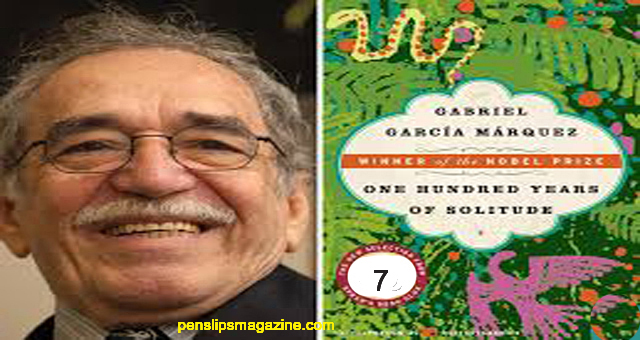
One Hundred Years of Solitude .. Garcia Marquiz
GABRIEL GARCIA MARQUEZ was born in Aracataca, Colombia in 1928, but he lived most of his life in Mexico and Europe. He attended the University of Bogota and later worked as staff reporter and film critic for the Colombian newspaper El Espectador. In addition to ONE HUNDRED YEARS OF SOLITUDE, he has also written two collections of short fiction, NO ONE WRITES TO THE COLONEL and LEAF STORM. Penslips Magazine intends to present this novel regularly.
ONE HUNDRED YEARS OF SOLITUDE
TRANSLATED FROM THE SPANISH
BY GREGORY RABASSA
ONE HUNDRED YEARS OF SOLITUDE
CHARACTERS
Jort Areadio BoendUi
m. Cnula Iguarln , olonel Aurellano Btiendia-,
-Jos6 Areadio
m-Rebeca , m. Remcdios Moscote. Remcdios Moscote , Aurcliano
SEVEN
Holding a child by each hand so as not to lose them in the tumult, bumping into acrobats with
gold-capped teeth and jugglers with six arms, suffocated by the mingled breath of manure and
sandals that the crowd exhaled, Jose Arcadio Buendia went about everywhere like a madman,
looking for Melquiades so that he could reveal to him the infinite secrets of that fabulous nightmare.
He asked several gypsies, who did not understand his language. Finally he reached the place where
Melquiades used to set up his tent and he found a taciturn Armenian who in Spanish was hawking a
syrup to make oneself invisible. He had drunk down a glass of the amber substance in one gulp as
Jose Arcadio Buendia elbowed his way through the absorbed group that was witnessing the
spectacle, and was able to ask his question. The gypsy wrapped him in the frightful climate of his
look before he turned into a puddle of pestilential and smoking pitch over which the echo of his
reply still floated: “Melquiades is dead.” Upset by the news, Jose Arcadio Buendia stood motionless,
trying to rise above his affliction, until the group dispersed, called away by other artifices, and the
puddle of the taciturn Armenian evaporated completely. Other gypsies confirmed later on that
Melquiades had in fact succumbed to the fever on the beach at Singapore and that his body had
been thrown into the deepest part of the Java Sea. The children had no interest in the news. They
insisted that their father take them to see the overwhelming novelty of the sages of Memphis that
was being advertised at the entrance of a tent that, according to what was said, had belonged to King
Solomon. They insisted so much that Jose Arcadio Buendia paid the thirty reales and led them into
the center of the tent, where there was a giant with a hairy torso and a shaved head, with a copper
ring in his nose and a heavy iron chain on his ankle, watching over a pirate chest. When it was
opened by the giant, the chest gave off a glacial exhalation. Inside there was only an enormous,
transparent block with infinite internal needles in which the light of the sunset was broken up into
colored stars. Disconcerted, knowing that the children were waiting for an immediate explanation,
Jose Arcadio Buendia ventured a murmur:
“It’s the largest diamond in the world.”
“No,” the gypsy countered. “It’s ice.”
Jose Arcadio Buendia, without understanding, stretched out his hand toward the cake, but the
giant moved it away. “Five reales more to touch it,” he said. Jose Arcadio Buendia paid them and
put his hand on the ice and held it there for several minutes as his heart filled with fear and
jubilation at the contact with mystery. Without knowing what to say, he paid ten reales more so that
his sons could have that prodigious experience. Little Jose Arcadio refused to touch it. Aureliano, on
the other hand, took a step forward and put his hand on it, withdrawing it immediately. “It’s
boiling,” he exclaimed, startled. But his father paid no attention to him. Intoxicated by the evidence
of the miracle, he forgot at that moment about the frustration of his delirious undertakings and
Melquiades’ body, abandoned to the appetite of the squids. He paid another five reales and with his
hand on the cake, as if giving testimony on the holy scriptures, he exclaimed:
“This is the great invention of our time.”